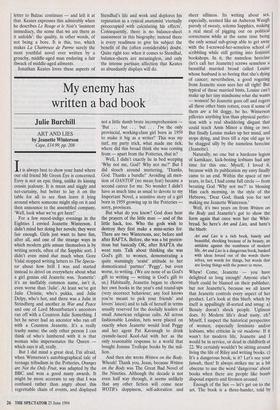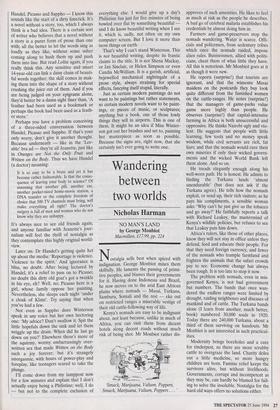My enemy has written a bad book
Julie Burchill
ART AND LIES It is always best to show your hand where our old friend Mr Green Eye is concerned. Envy is not an epic thing, unlike its kissing cousin jealousy. It is mean and niggly and net-curtainy, but better to lay it on the table for all to see than leave it lying around where someone might slip on it and then announce to the assembled company, `Well, look what we've got here!'
For a few mood-indigo evenings in the Eighties I envied Jeanette Winterson. I didn't mind her doing her novels; they were fair enough. Girls just want to have fun, after all, and one of the strange ways in which modern girls amuse themselves is by writing novels, often of the Sapphic sort. I didn't even mind that much when Gore Vidal stopped writing letters to The Specta- tor about how brill I was and started instead to drivel on everywhere about what a girl genius old Jeanette was. 'Jeanette': it's an ineffably common name, isn't it, even worse than 'Julie'. At least we've got Julie Christie, who's pukka, and Julie Delpy, who's hot, and there was a Julie in Strindberg and another in War and Peace and one of Lord Mountbatten's ancestors ran off with a Countess Julie Something. I bet he never had an ancestor who ran off with a Countess Jeanette. It's a really trashy name; the only other person I can think of who's lumbered with it is that woman who impersonates the Queen which says it all, really.
But I did mind a great deal, I'm afraid, when Winterson's autobiographical tale of teenage tribadism in the Potteries, Oranges are Not the Only Fruit, was adapted by the BBC and won a good many awards. It might be more accurate to say that I was confused rather than angry about this regrettable chain of events, and displayed not a little dumb brute incomprehension 'But . . . but . . . but . . . I'm the only provincial, working-class girl born in 1959 to make it big as a writer!' This was my turf, my party trick, what made me tick; where did this broad think she was coming from — apart from the Potteries, that is?
Well, I didn't exactly lie in bed weeping `Why not me, God? Why not me?' But I did slouch around muttering, 'Thanks, God. Thanks a bundle!' Avoiding all men- tion of OANTOF (no mean feat) became a second career for me. No wonder I didn't have as much time as usual to devote to my Important Novel, a sensitive story of a girl born in 1959 growing up in the Potteries sorry, provinces.
But what do you know? God does hear the prayers of the little man — and of the little hack, too. Who the gods wish to destroy they first make a mini-series for. There are two Wintersons, see; before and after BAFTA. Before, she was a bit preten- tious but basically OK; after BAFTA she went nuts. Talk about thinking she was God's gift: to women, demonstrating a quite stunningly 'sexist' attitude to her domesticated `partner"Peggy', but even worse, to writing. (We are none of us God's gift to writing — writing is God's gift to us.) Habitually, Jeanette began to choose her own books in the year's end round-ups (very incorrect behaviour; any fool knows you're meant to pick your friends' and lovers' latest) and to talk of herself in terms usually reserved for the doolally leaders of small American religious cults. All across fashionable London, bets were placed on exactly when Jeanette would lead Peggy and her agent Pat Kavanagh to drink cyanide-laced Kool-Aid with her as the only reasonable response to a world that bought Joanna Trollope books by the mil- lion.
And then she wrote Written on the Body. Whoah! Thank you, Jesus, because Written on the Body was The Great Bad Novel of the Nineties. Although the decade is not even half way through, it seems unlikely that any other fiction will come near WOTB's sloppiness, self-adoration and sheer silliness. Its writing about sex, especially, seemed like an Auberon Waugh parody of sweaty, solemn Sapphics, making a real meal of pigging out on political correctness while at the same time being the only sexual sub-group able to get away with the I-screwed-her-senseless school of scribbling while still getting into feminist bookshops. In it, the nameless hero/ine (let's call her Jeanette) screws senseless a beautiful married broad called Louise whose husband is so boring that she's dying of cancer; nevertheless, a good rogering from Jeanette soon sees her all right! But typical of these married bints, Louise can't make up her tiny mindsome what she wants — women! So Jeanette goes off and rogers all these other bints rotten, even if some of them are a bit doggy, ho ho. Winterson pillories anything less than physical perfec- tion with a real shuddering disgust that could teach Amis Minor a thing or two. But finally Louise makes up her mind, and stops dying, and lives till a ripe old age to be shagged silly by the nameless hero/ine (Jeanette).
Naturally, no one but a hardcore legion of kamikaze, kick-boxing lesbians had any time for this one. Myself, I loved it, because with its publication my envy finally came to an end. Within the space of two years, in fact, I had come full circle — from berating God 'Why not me?' to blessing Him each morning, in the style of the Hebrews, 'Dear God, thank you for not making me Jeanette Winterson.'
Well, it's two years on from Written on the Body and Jeanette's got to show the form again that once won her the Whit- bread. So here's Art and Lies, and here's the blurb:
Art and Lies is a rich book, bawdy and beautiful, shocking because of its beauty, an antidote against the numbness of modern life. Art and Lies is a dangerous book, banked with ideas forced out of the words them- selves, not words for things, but words that are loving things with the power to move.
Whew! Come, Jeanette — you have delighted us long enough! Anyone else's blurb could be blamed on their publisher, but not Jeanette's, because we all know that Jeanette controls every aspect of her product. Let's look at this blurb, which by itself is appallingly ill-sorted and smug: a) Beauty doesn't shock people. Ugliness does. b) Modern life's dead nasty, eh? Myself, I suspect the historical perspective of women, especially feminists and/or lesbians, who criticise la vie modeme. If it wasn't for modern life, Jeanette and I would be in service, or dead in childbirth at 22. We certainly wouldn't be sitting around living the life of Riley and writing books. c) It's a dangerous book, is it? Let's see your fatwah, then! It always strikes me as a bit obscene to use the word 'dangerous' about books when there are people like bomb disposal experts and firemen around.
Enough of the lies — let's get on to the art. The book is a three-hander, told by Handel, Picasso and Sappho — I know this sounds like the start of a dirty limerick. It's a novel without a story, too, which I always think is a bad idea. There is a certain sort of writer who believes that a novel without a story is a purer form of prose than one with; all the better to let the words sing as loudly as they like, without some usher coming along to hush them up and push them into line. But read Lolita again, if you really think this. Any sensitive and smart 14-year-old can link a daisy chain of beauti- ful words together; the skill comes in mak- ing them into the shape of a story without crushing the juice out of them. And if you are being judged on your epigrams alone, they'd better be a damn sight finer than, 'A feather had been used as a bookmark or perhaps the book had been used as a feath- er store.'
Perhaps you have a problem conceiving of a three-sided conversation between Handel, Picasso and Sappho. If that's your only worry, don't give it another thought. Because underneath — like m the 'Lov- able' bra ad — they're all Jeanette, just like in Oranges are Not the Only Fruit and Written on the Body. Thus we have Handel (a doctor) moaning:
It is so easy to be a brute and yet it has become rather fashionable. Is that the conse- quence of leaving your body to science? Of assuming that another pill, another car, another pocket-sized home-movie station, a DNA transfer or the complete freedom of choice that 500 TV channels must bring, will make everything all right? The doctor's surgery is full of men and women who do not know why they are unhappy.
It's always nice to see old friends again, and anyone familiar with Jeanette's jour- nalism will feel the thrill of nostalgia as they contemplate this highly original world- view.
Later on. Dr Handel's getting quite het up about the media: 'Reportage is violence. Violence to the spirit.' And ignorance is bliss, no doubt. After being lectured by Handel, it's a relief to pass on to Picasso; no doubt this dirty old goat's got a twinkle in his eye, eh? Well, no; Picasso here is a girl, whose family oppose her painting. Nevertheless, she sleeps each night 'under a cloak of Klimt'. Try saying that when you've had a few.
Not even as Sappho does Winterson speak in any voice but her own hectoring one: 'My advice? Don't swallow it. Spit the little hopefuls down the sink and let them wriggle up the drain. When did he last go down on you?' Elsewhere there's more of the squirmy, wormy embarrassingly over- written sex that made Written on the Body such a joy forever; but it's strangely unorgasmic, with hours of power-play and foreplay, like teenagers scared to take the plunge. I'll come down from my lamppost now for a few minutes and explain that I don't actually enjoy being a Philistine; well, I do — but not to the complete exclusion of everything else. I would give up a day's Philistine fun just for five minutes of being bowled over flat by something beautiful and I do know beautiful writing when I see it, which is, sadly, not often on my own computer screen. But I love it more than most things on earth.
That's why I can't stand Winterson. This is not beautiful writing, despite its frantic claims to the title. It is not Shena Mackay, or Ian Sinclair, or Helen Simpson or even Candia McWilliam. It is a garish, artificial, bejewelled mechanical nightingale of a prose style, always straining for special effects, fancying itself stupid, literally.
Just as certain modern paintings do not want to be paintings but rather statements, so certain modern novels want to be paint- ings, or pieces of music, or sculptures; anything but a book, one of those lowly things they sell in airports. This is one of them. It might be an idea if Miss Winter- son got out her brushes and set to, painting her masterpiece as soon as possible. Because the signs are, right now, that she certainly isn't ever going to write one.

































































 Previous page
Previous page